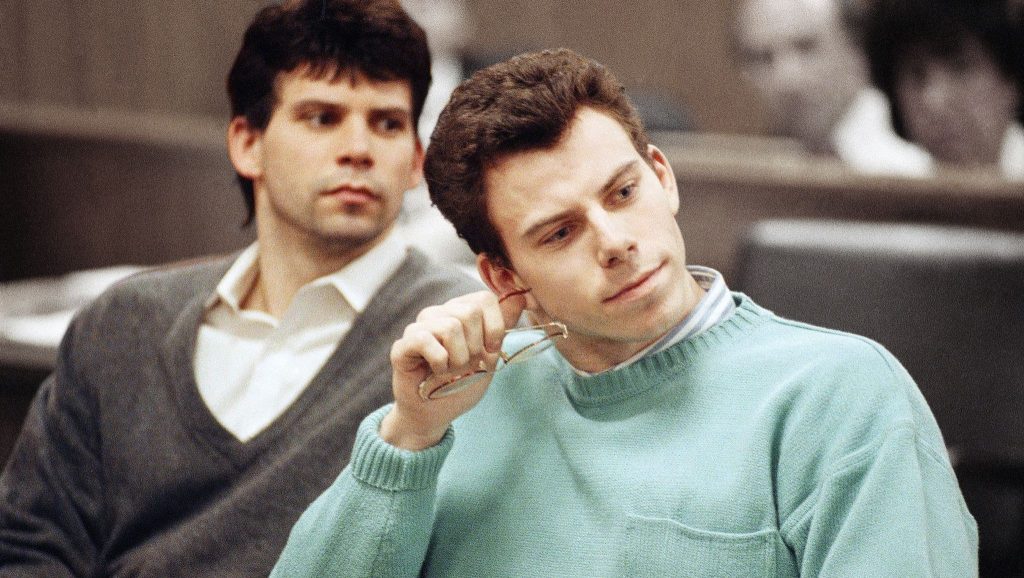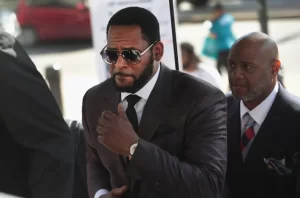The Impact of True Crime Documentaries on Legal Outcomes
3 min read
Lyle Menendez, and his brother Erik Menendez, during a court appearance in 1991. (Kevork Djansenzian / Associated Press)

Lyle Menendez, and his brother Erik Menendez, during a court appearance in 1991. (Kevork Djansenzian / Associated Press)
The phenomenon of true crime has become an American fixation, transforming ordinary viewers into armchair detectives as they engage with a multitude of podcasts and television series. Notably, some of these projects have influenced actual legal proceedings, bringing renewed attention to long-closed cases.
One striking instance is the case of Erik and Lyle Menendez, who were sentenced to life in prison for the 1989 murders of their parents, Jose and Kitty Menendez, in their Beverly Hills home. Recently, Los Angeles prosecutors announced they are reassessing new evidence related to the case, including a letter from Erik Menendez, now 53. His legal team contends this letter supports claims that both brothers suffered years of sexual abuse at the hands of their father.
The Menendez brothers’ attorneys also referenced the Peacock docuseries “Menendez + Menudo: Boys Betrayed,” which featured an interview with a former member of the boy band Menudo. This individual alleged he was raped by Jose Menendez at age 14, further complicating the narrative surrounding the brothers’ actions.
Interest in the Menendez case has surged recently, partly due to Ryan Murphy’s Netflix series, “Monsters: The Lyle and Erik Menendez Story.” While the brothers have criticized the portrayal as inaccurate, the dramatization has spotlighted their ongoing legal efforts, drawing support from high-profile figures like Kim Kardashian. Murphy himself noted the power of television to illuminate difficult topics and shape public opinion, emphasizing how such productions can reinvigorate interest in cases long deemed resolved.
The Menendez brothers’ case isn’t the only instance where pop culture has seemingly prompted legal action. Several high-profile criminal cases have experienced similar trajectories due to media representation.
R. Kelly and “Surviving R. Kelly”

R&B singer R. Kelly faced significant legal consequences after the release of the 2019 docuseries “Surviving R. Kelly.” Previously acquitted in 2008 of child pornography charges, Kelly found himself at the center of renewed allegations when several women came forward to share their experiences of abuse in the series. The revelations led to a 13-count indictment against Kelly, which included charges of child pornography and sex trafficking. Ultimately, he was convicted of federal racketeering and sex trafficking in 2021 and sentenced to 30 years in prison.
Steve Avery, Brendan Dassey, and “Making a Murderer”

The 2015 Netflix docuseries “Making a Murderer” chronicled the story of Steven Avery and his nephew Brendan Dassey, who were convicted of the murder of Teresa Halbach in 2005. The series captured widespread attention, inspiring extensive online discussions and theories about the case. While both men were sentenced to life in prison, Dassey’s conviction was initially overturned in 2016, though it was later reinstated after an appeal. Avery has faced numerous legal challenges over the years but remains incarcerated.
Robert Durst and “The Jinx”

The HBO series “The Jinx: The Life and Deaths of Robert Durst” also had a profound impact on its subject. Durst, a New York real estate heir, was arrested shortly before the show’s finale aired in 2015. The series explored multiple unsolved cases connected to him, including the 1982 disappearance of his wife. As the series unfolded, Durst was indicted for the murder of his friend Susan Berman. He was ultimately convicted in 2021 and sentenced to life without parole. Durst’s story illustrates how the media can not only investigate but also influence legal outcomes.
Adnan Syed and “Serial”

The podcast “Serial” revolutionized true crime storytelling and played a crucial role in the case of Adnan Syed, who was convicted of murdering his high school girlfriend, Hae Min Lee, in 1999. The first season of “Serial,” released in 2014, garnered over 300 million downloads and reignited interest in Syed’s conviction. This renewed scrutiny ultimately led to the vacating of his conviction in September 2022, although legal battles continue regarding his status.
These examples illustrate the complex relationship between true crime media and the justice system. As public interest grows, so too does the potential for legal reevaluation, demonstrating that storytelling in various forms can leave an indelible mark on the pursuit of justice.